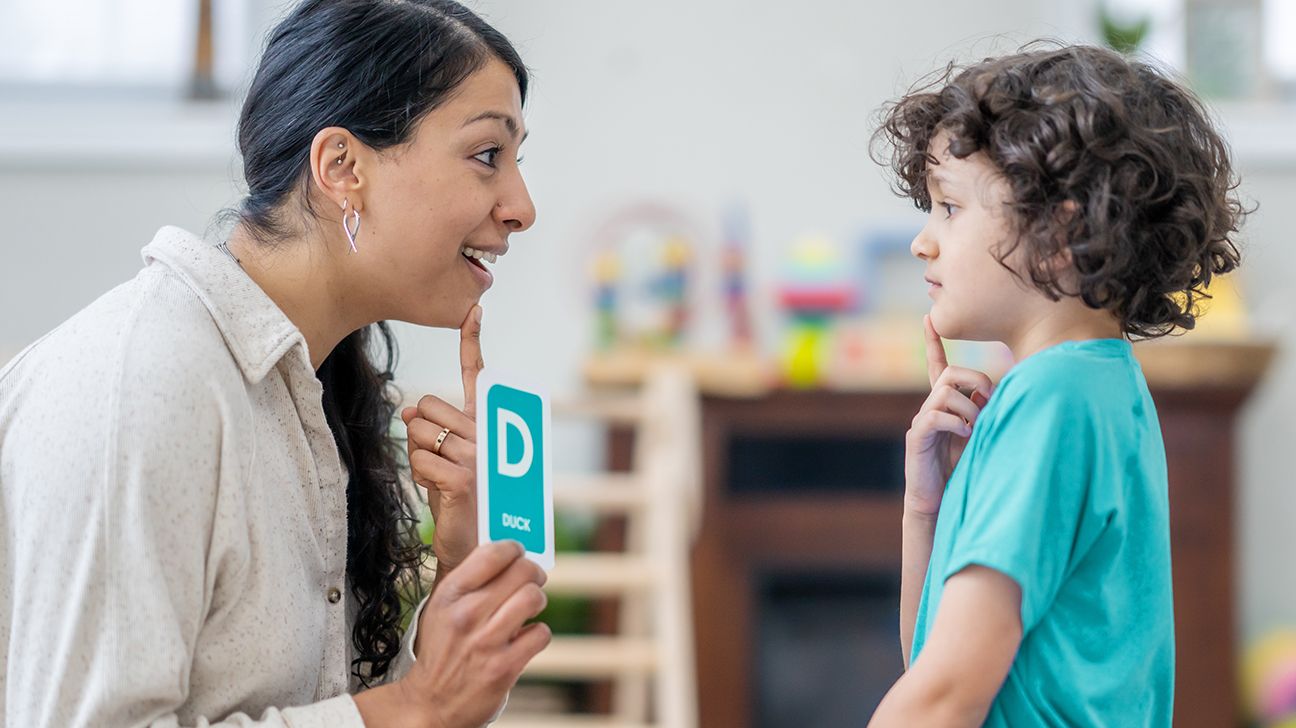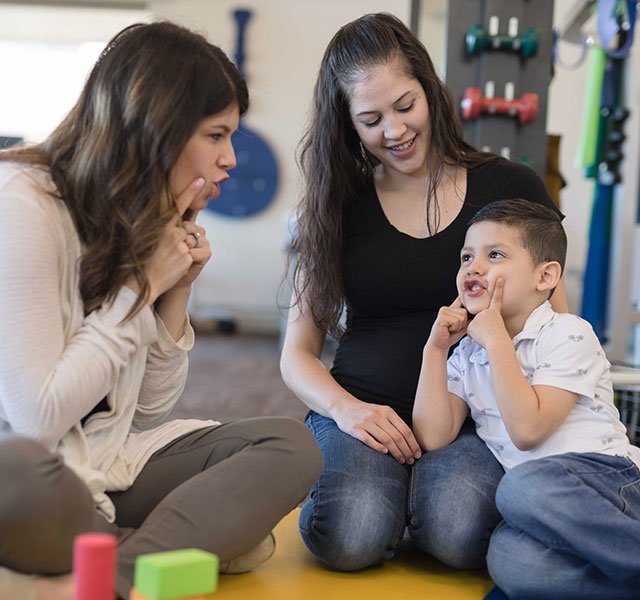Imagine watching your child struggle to express themselves, feeling their frustration as they try to communicate their thoughts and feelings. You want to help them, but where do you start?
If your child is autistic, you might be wondering if speech therapy could be the key to unlocking their potential. You’re not alone in seeking answers. Many parents share your concerns and hope to improve their child’s communication skills. You’ll discover the benefits of speech therapy for autistic children and how it can make a difference in your child’s life.
Ready to explore how speech therapy might be the solution you’ve been looking for? Let’s dive in!
Autism And Communication Challenges
Autistic children often face unique communication challenges. These difficulties can affect their ability to express themselves and understand others. Communication is crucial for social interaction, learning, and development. Speech therapy can play a vital role in helping autistic children improve their communication skills. Understanding these challenges is the first step toward effective intervention.
Understanding Autism Spectrum Disorders
Autism Spectrum Disorders (ASD) impact social skills and communication. Each child with autism is unique, showing different communication abilities. Some may have limited speech, while others might struggle with social cues. Speech therapy can help tailor communication strategies to each child’s needs.
Common Communication Barriers
Autistic children might face various communication barriers. They may find it hard to understand tone or facial expressions. Some struggle with maintaining eye contact or interpreting gestures. Others might repeat phrases or have trouble with conversation flow. Speech therapy aims to address these specific barriers, enhancing overall communication.

Credit: www.healthline.com
Role Of Speech Therapy
Speech therapy plays a crucial role in supporting autistic children, helping them to communicate effectively and interact with others. It’s not just about teaching words; it’s about enhancing their ability to express themselves and understand social cues. Through targeted approaches, speech therapy can make a significant difference in the lives of autistic children.
Benefits For Autistic Children
Speech therapy offers numerous benefits, enhancing both verbal and non-verbal communication skills. It can help autistic children articulate words clearly, improving their ability to convey needs and emotions. This boost in communication can lead to better social interaction and increased confidence.
Beyond words, speech therapy assists in understanding body language and facial expressions. Imagine your child recognizing a friend’s smile or a parent’s frown. These subtle skills can enrich their social experiences and relationships. Communication is not just about speaking; it’s about connecting.
Tailoring Therapy To Individual Needs
Every autistic child is unique, with individual strengths and challenges. Speech therapy tailors strategies to meet these diverse needs. Some children might benefit from visual aids, while others thrive with interactive games. Customizing therapy ensures it’s effective and engaging.
Consider your child’s favorite activities. Integrating these into therapy sessions can motivate participation and enhance learning. If your child loves drawing, incorporating storytelling through art can make communication fun. Tailored therapy is about discovering what works best for your child.
Have you ever wondered what motivates your child to communicate? Identifying these triggers can be key to successful speech therapy. Personalized approaches ensure that therapy resonates with your child, making it a positive and rewarding experience.
Speech Therapy Techniques
Speech therapy can be a pivotal part of the developmental journey for autistic children. Each child is unique, and speech therapy techniques can be tailored to meet individual needs, ensuring effective communication strategies are learned. From traditional methods to modern technological approaches, there are numerous ways speech therapy can support autistic children in enhancing their communication skills.
Popular Methods Used
Speech therapists often utilize a range of techniques to help autistic children develop their communication skills. One popular method is using visual aids. These can be pictures or flashcards that help children associate words with images. This approach can make learning new words less abstract.
Another effective technique is modeling, where therapists demonstrate correct speech patterns for children to mimic. This can be done through interactive play, which makes learning engaging and fun. Have you ever considered how simple games can be transformed into learning tools?
Integrating Technology In Therapy
Technology is increasingly becoming a part of speech therapy sessions. There are various apps designed to aid speech development. These apps can be interactive, allowing children to learn at their own pace while having fun.
Tablets and computers can also be used to create personalized learning experiences. They can offer a variety of activities that cater to different learning styles. How might a digital approach change the way your child interacts with language?
While traditional methods have their place, technology offers new avenues for engagement. It provides a dynamic learning environment that can be particularly beneficial for children who are comfortable with digital devices.
Understanding the right combination of techniques for your child can be a journey. What matters is finding what resonates with them and makes communication feel more natural. Would you be willing to try a new method if it meant your child could communicate more effectively?

Credit: www.henryford.com
Collaboration With Parents And Educators
Autistic children often benefit from speech therapy. It helps improve their communication skills. Parents and educators can work together to support this therapy. Collaboration ensures consistent learning at home and school.
Collaboration between parents, educators, and therapists is crucial in supporting autistic children who may need speech therapy. Working together creates a holistic approach that caters to the child’s unique needs. This partnership can significantly enhance the effectiveness of therapy sessions and ensure consistent progress.
Building A Supportive Environment
Creating a supportive environment involves everyone in the child’s life. Parents and educators play a key role in reinforcing speech therapy techniques at home and school. This consistent support helps autistic children feel understood and encourages them to communicate more effectively. A supportive environment also means being patient and attentive. Recognize the child’s communication style and adapt your approach accordingly. Celebrate small victories to boost confidence and motivation.
Training And Resources For Caregivers
Training and resources empower caregivers to support the child’s speech development. Workshops and online courses can equip you with strategies and tools used in therapy sessions. These resources help you to understand and apply techniques effectively. Sharing insights and experiences with other parents can be incredibly beneficial. You can learn from each other’s successes and challenges. This community support can provide both emotional encouragement and practical advice. Have you ever considered how your involvement could accelerate your child’s progress? By actively participating in this collaborative effort, you are not just a spectator but a vital part of your child’s communication journey.
Evaluating Progress And Outcomes
Evaluating progress in autistic children often includes assessing their speech development. Speech therapy can help improve communication skills and social interaction. Tailored approaches ensure each child’s unique needs are met effectively.
Evaluating progress and outcomes in speech therapy for autistic children is crucial. It helps determine if the therapy is making a difference and guides future strategies. You may wonder how to effectively measure this progress and what factors should be considered. Understanding how to set goals and assess effectiveness can transform your child’s therapy experience.
Setting Goals And Milestones
Setting clear goals is essential in speech therapy. Think about what you want your child to achieve in terms of communication skills. Start small. Simple goals could include recognizing words or expressing basic needs. Milestones help track progress and keep the therapy focused. Celebrating small victories boosts your child’s confidence and motivation. What milestones would you celebrate with your child?
Assessing Effectiveness Of Therapy
Assessing the effectiveness of therapy involves regular reviews. Are there noticeable improvements in your child’s communication? Use practical tools like progress charts or apps to monitor changes. They provide visual proof of success and areas that need more work. Feedback from your child is vital. Do they feel more confident speaking or interacting? Their experiences can offer valuable insights into the therapy’s impact. Remember, evaluating progress is not just about numbers. It’s about understanding and supporting your child’s unique journey. What insights have you discovered in your child’s therapy experience?

Credit: www.therapyplacenj.com
Challenges And Considerations
Speech therapy offers many benefits for autistic children. Yet, it also presents challenges. Parents and therapists must navigate various obstacles to ensure effective communication. Understanding these challenges is key to successful therapy outcomes.
Overcoming Resistance To Therapy
Some children may resist speech therapy sessions. They might feel uncomfortable or anxious. Patience and consistency can help reduce this resistance. Building trust with the therapist is essential. Gradual exposure to sessions may ease their discomfort.
Adapting To Different Communication Styles
Autistic children communicate in unique ways. Some may rely on non-verbal cues. Others might use picture cards or digital devices. Therapists need to adapt to these diverse styles. Customizing approaches ensures each child receives personalized support.
Frequently Asked Questions
Do All Kids With Autism Need Speech Therapy?
Not all kids with autism need speech therapy. Some may benefit from it, while others may not. Each child’s needs vary based on their communication challenges. Consulting a specialist helps determine if speech therapy is necessary. Early assessment and intervention often lead to better outcomes for children with autism.
What Is The Best Therapy For Autism?
Applied Behavior Analysis (ABA) is often considered the best therapy for autism. ABA focuses on improving social skills, communication, and behavior through structured techniques. It is tailored to individual needs, promoting positive change and skill development. Early intervention usually yields the best results in children with autism.
At What Age Do Autistic Kids Talk?
Autistic children often start talking at different ages. Some may begin around age 2, while others may speak later. Early intervention and speech therapy can support language development. Each child’s progress varies, and consistent support is crucial for improving communication skills.
What Are The Needs Of A Child With Autism?
Children with autism need personalized support, routine stability, clear communication, sensory-friendly environments, and social skills development. Encourage their interests and celebrate achievements.
Conclusion
Speech therapy helps autistic children communicate better. It builds confidence and social skills. Every child is unique. Some may need speech therapy more than others. Parents should consult professionals for guidance. Early intervention can make a difference. Communication opens doors to understanding.
Therapy can be a valuable tool. Explore options to support your child’s growth. Empower them with the skills they need. Encourage their journey towards expression. Speech therapy can offer hope. It fosters connection with the world. Your child can achieve more.
